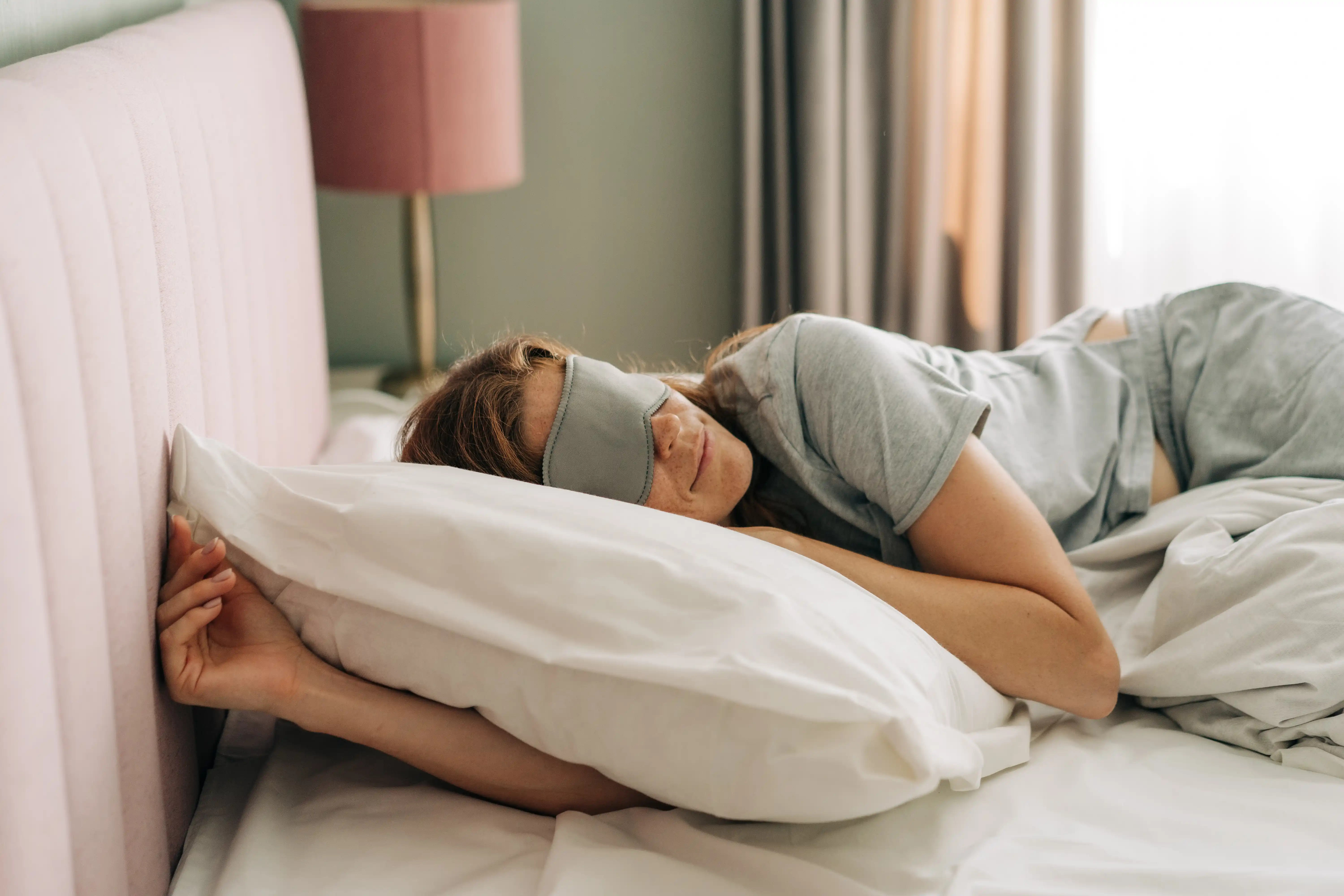Head injuries, ranging from mild impacts to more severe trauma, are a significant concern for individuals and caregivers alike. While medical professionals are often consulted for severe injuries, understanding how to manage mild head injuries safely is essential for effective recovery.
One of the most common concerns following a head injury revolves around sleep and safety during recovery. There’s often uncertainty about whether a person should rest or be continuously monitored. While these concerns are understandable, most physical health injuries, such as concussions, can be safely managed with appropriate care, observation, and awareness of warning signs. Understanding when it's safe to sleep and when medical attention is necessary is key to promoting a safe and smooth recovery.
This article reviews the role of sleep in recovery after a head injury, offering guidance on when it's safe to sleep, what symptoms to monitor, and how to promote a restful and safe recovery process.
Why People Worry About Sleeping After a Head Injury
After someone suffers a blow to the head, it's common to hear advice like, “Don’t let them fall asleep.” This concern has circulated for decades, fueled by cautionary tales and dramatized portrayals in movies.
The idea that sleeping after a head injury could lead to slipping into a coma or never waking up has created lasting anxiety, especially for parents, athletes, and caregivers. But is this fear based on medical fact, or is it outdated advice that needs revisiting?
The Fear of "Not Waking Up”
The main fear around sleeping after a head injury is that a person might lose consciousness from a brain bleed or swelling and won’t be able to wake up. While this type of event is a real concern in severe head injuries, it’s far less likely with mild concussions.
That said, monitoring for symptoms after the injury is important to rule out any serious complications before sleep is encouraged.
Symptoms of Mild Head Injury (Concussion)

A concussion is a mild traumatic brain injury (TBI) usually caused by a blow to the head or a sudden jolt. Symptoms may include:
Headache
One of the most common symptoms, a concussion-related headache, can range from dull pressure to sharp pain and may worsen with movement or noise.
It may feel like a tight band around the head or a throbbing sensation behind the eyes. Headaches can last for several days, especially without adequate rest.
Dizziness
Feeling lightheaded, unsteady, or off-balance is often reported, especially when standing or walking. Some people describe the sensation as if the room is spinning or tilting. Dizziness may also contribute to difficulty concentrating or nausea.
Nausea
A sense of queasiness, sometimes accompanied by vomiting, can result from the brain’s response to trauma. Nausea can be mild due to lack of sleep, or it can be persistent and disruptive as a result of something more severe. It can also be triggered by movement or visual stimulation, such as watching screens.
Confusion
People may appear dazed, have trouble concentrating, or feel mentally “foggy.” They might respond slowly to questions or have difficulty recalling simple facts. This confusion can affect work, school, and daily tasks, making it important to rest the brain.
Memory Problems
Short-term memory loss, such as forgetting the injury itself or recent events, is typical in concussions. A person may not remember what happened just before or right after the impact. This memory gap is often temporary but can be disorienting and unsettling.
Sensitivity to Light and Sound
Bright lights or loud environments may feel uncomfortable or overwhelming, as the brain becomes temporarily hypersensitive.
Everyday sounds, like music or conversations, can feel irritating or even painful. Screen time and fluorescent lights may worsen symptoms, making rest in a quiet, dim space helpful.
When It’s Safe to Sleep After Hitting Your Head
In most cases, it’s perfectly safe to sleep after a mild head injury, especially once serious symptoms have been ruled out. If the injured person is alert, oriented, and not showing any red flag signs, then sleep can be beneficial. Rest helps the brain heal, and for people with concussions, quality sleep is part of the recovery process.
It’s still important to monitor symptoms for the first few hours after the injury. If you're unsure whether it’s safe to let someone sleep, observe them for a short period—usually 1 to 2 hours—and check for signs like normal speech, balanced movement, and clear thinking. If they pass this “observation window,” sleeping is generally considered safe.
When You Should NOT Go to Sleep After a Head Injury

Even though sleep is often safe, there are red flag symptoms that indicate the need for urgent medical care. You should seek emergency help and avoid sleep until evaluated if the person:
Lost Consciousness For A Few Seconds
Even a brief loss of consciousness may signal a concussion or more serious brain trauma. It’s essential to be assessed to rule out internal bleeding or swelling.
Difficult To Wake Up
If the person seems unusually drowsy or hard to wake, it could be a sign of pressure on the brain. This is a medical emergency that requires immediate attention.
Vomiting Repeatedly
While one episode of nausea or vomiting can be normal, multiple episodes raise concern. Repeated vomiting may indicate increased intracranial pressure.
Seizures
A seizure after a head injury may signal abnormal brain activity or serious trauma. It’s important to seek emergency care to prevent further complications.
Memory Loss
Inability to recall events before or after the injury may point to brain disruption. If memory problems persist or worsen, it’s not safe to allow the person to sleep without medical evaluation.
Slurred Speech
Speech that sounds garbled or slow may be a sign of neurological impairment. This could indicate swelling or bleeding in the brain.
Vision Changes
Blurry vision, double vision, or seeing flashing lights can all be signs of brain dysfunction. These symptoms should never be ignored after a head injury.
Fluid Draining From Ears Or Nose
Clear or bloody fluid leaking from the ears or nose may indicate a skull fracture. This requires urgent care and imaging to assess internal damage.
Pupils Unequal In Size
Uneven pupils can signal pressure or bleeding in the brain affecting the cranial nerves. It’s a red flag symptom that needs immediate medical attention.
Numbness In Limbs
Tingling, weakness, or numbness in the arms or legs may suggest spinal or brain injury. These symptoms can be signs of nerve damage or serious trauma.
A Worsening Headache
Headaches are common after a concussion, but if the pain intensifies over time, it could mean bleeding or swelling in the brain. A worsening headache, especially with other symptoms, should not be ignored.
Children And Head Injuries
Head injuries in children are common due to falls, play, or sports, but most are mild and not serious. However, kids can’t always describe how they feel, so it's important to watch for signs like vomiting, excessive sleepiness, irritability, or trouble walking.
If a child loses consciousness, has a seizure, or shows unusual behavior, seek medical care immediately. Even with a mild bump, it's best to monitor them closely for 24 hours. Often, rest and quiet time are all that's needed, but when in doubt, a call to your pediatrician offers peace of mind.
How Sleep Supports Recovery After a Concussion

Sleep plays a vital role in healing the brain after a concussion. During sleep, your body and brain engage in critical recovery processes that help reduce symptoms and promote long-term healing.
Repair Damaged Cells
Sleep triggers cellular repair processes, helping the brain recover from microscopic damage caused by the injury. This includes restoring energy levels in brain cells and repairing tissue stress.
Reduce Inflammation
Concussions can lead to inflammation in the brain. Deep sleep helps lower this inflammation by regulating immune system activity, which can reduce symptoms like headaches or fogginess.
Rebalance Neurotransmitters
Sleep helps restore balance to brain chemicals that are disrupted by a concussion. This can improve mood, reduce anxiety, and promote more stable brain function overall.
Improve Cognitive Function
Restorative sleep supports memory, attention, and decision-making—all areas that can suffer after a concussion. Consistent, high-quality sleep speeds up mental clarity and shortens recovery time.
Tips for Safe Sleep After a Head Injury
If you or someone close has a mild head injury and has been cleared by a doctor, here are a few things you can do to make sleep safer and more restful:
Sleep with Someone Nearby
Having a trusted person in the room provides peace of mind in case symptoms worsen overnight. They can monitor for unusual breathing, confusion, or difficulty waking.
Elevate Your Head Slightly
Sleeping with your head slightly raised—using an extra pillow or an adjustable bed—may reduce pressure and help prevent headaches or dizziness.
Avoid Alcohol and Sedatives
Alcohol and sedatives can interfere with brain function and mask important warning signs. It’s best to avoid anything that depresses the central nervous system while healing.
Set An Alarm
For the first night, consider setting an alarm every few hours to check on the person, especially if they experienced symptoms earlier in the day. This is often done as a precaution.
Monitor Your Symptoms
Before going to sleep, make a note of how you're feeling. If anything changes after waking, such as worsened confusion, headache, or nausea, seek medical advice immediately.
FAQs
Is It Safe to Sleep After Hitting Your Head?
In most cases, yes—it is safe to sleep after a minor head injury, such as a mild bump or concussion, as long as the person is alert and shows no red flag symptoms. If you’ve been evaluated by a healthcare provider and no signs of serious brain trauma are present, sleep can help the brain heal. When in doubt, get medical advice before resting.
What Symptoms Should I Watch for Before Sleeping?
Before going to sleep, check for warning signs like confusion, persistent vomiting, severe headache, unequal pupils, slurred speech, or difficulty waking. If any of these symptoms are present, seek emergency care immediately. These may indicate a more serious issue, such as a brain bleed, which can worsen during sleep if left untreated.
Should I Wake Someone Up After They Hit Their Head?
If the injury is mild and they’ve been medically cleared, there’s no need to wake them. But if you don't know how serious it is or if no medical evaluation was done, wake them up every few hours to check their responsiveness. If they’re difficult to wake or seem confused, contact a doctor right away.
Why Was I Told Never to Let Someone Sleep After a Concussion?
This advice comes from older practices when tools to monitor concussions were limited. Today, doctors agree that sleep is safe and important for recovery, as long as serious symptoms have been ruled out. The focus is now on early evaluation and observation, rather than keeping someone awake unnecessarily.
What Should I Do Right After Hitting My Head?
Immediately after a head injury, assess the severity. Stay calm and look for symptoms like dizziness, nausea, memory loss, or confusion. Apply ice if there’s swelling and avoid physical or mental exertion. If any red flags appear, go to the ER or urgent care. If everything seems mild and improves quickly, rest and monitor at home.
Can a Child Sleep After Hitting Their Head?
Often, yes—if the child is alert, acting normally, and not showing concerning symptoms, it’s safe to let them sleep. Young children may cry from the shock, but settle quickly. However, call your pediatrician if you're unsure or if the child is under 2 years old. Always observe them closely for changes in behavior or alertness.
Conclusion
Knowing when it's safe to sleep after a head injury can significantly impact recovery. While mild concussions often resolve with rest, it’s important to monitor symptoms and stay alert for any red flags. In fact, sleep plays a powerful role in the brain's healing process.
Karen Barnard
Karen is a Human Movement Science expert and a certified sports nutrition and massage therapist. At Sleepiverse, she combines her passion for human movement science and sleep health to educate herself and her readers about healthier sleep. In addition to writing articles, Karen manages a fitness studio offering private training, athletic conditioning, and sports massage therapy. She focuses on providing people with a holistic environment for people to reach their health goals, often incorporating stretch therapy to promote mental tranquillity and help people improve their sleep.


